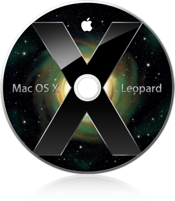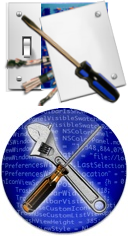Nov
26
Another Nice QuickLook Plugin
Filed Under Computers & Tech on November 26, 2007 | Leave a Comment
Following on from my post yesterday about the Enscript QuickLook plugin I came across another nice QuickLook plugin today. When it comes to viewing images, movies, text, office documents etc. QuickLook is great. When it comes to showing you a folder it is USELESS! It just shows a massive folder icon. What’s the point of that! Well, Folder.qlgenerator offers a nice alternative. It shows a list of folder contents with thumbnails as the QuikLook preview for a folder. This is a great little third-party tweak for OS X Leopard.
[tags]Apple, Leopard, OS X, QuickLook[/tags]
Nov
25
Bart’s TimeMachine Tips
Filed Under Computers & Tech, Security, System Administration on November 25, 2007 | Leave a Comment
 Time Machine is the fantastic new backup feature built into OS X 10.5 Leopard. It’s pretty simple to set up and it will work if you leave all the defaults as they are. The defaults are fairly intelligent. For example, your
Time Machine is the fantastic new backup feature built into OS X 10.5 Leopard. It’s pretty simple to set up and it will work if you leave all the defaults as they are. The defaults are fairly intelligent. For example, your Library/Caches is automatically excluded from the backup. However, if you wish to use space on your Time Machine disk efficiently you may wish to configure Time Machine to exclude a few more folders.
[tags]Apple, OS X, Leopard, Time Machine[/tags]
Nov
25
A QuickLook Plugin for Programmers
Filed Under Computers & Tech, Software Development on | 2 Comments
This week I installed my first QuickLook extension, QLEnscript by Dave Dribin. It uses the Enscript libraries to provide syntax highlighting for a number of common languages within QuickLook. Nothing fancy but handy for programmers none the less. You can find out more in this post on Dave’s blog.
[tags]OS X, Leopard, QuickLook, Enscript[/tags]
Nov
19
Breaking News – Leopard Menubar Transparency Fix
Filed Under Computers & Tech on November 19, 2007 | 8 Comments
Yesterday I pointed out that OS X Leopard actually looks BETTER on old hardware because some of the fluff is turned off. This obviously implies that there is some hidden internal setting for controlling the fluff. Well, someone has found that setting! With a simple terminal command you can now get the nice solid Menubar on any Mac. Just fire up a terminal and enter the command (all on one line):
sudo defaults write /System/Library/LaunchDaemons/com.apple.WindowServer 'EnvironmentVariables' -dict 'CI_NO_BACKGROUND_IMAGE' 1
You can only do this from an administrator account and you’ll have to enter your password. The command won’t have an immediate effect. You have to reboot your Mac to see your new and improved Menubar. I’ve tested this on my G5 PowerMac and my MacBook Pro, it seems to work flawlessly.
You can get more details in this ars technica article.
Nov
18
The Irony Of Leopard – Old is Better than New
Filed Under Computers & Tech on November 18, 2007 | 5 Comments
I have Leopard running on a range of machines from a first generation MacMini with a G4 processor and 32MB of graphics RAM, to a 17″ MacBookPro with a CoreDuo and 256MB of graphics RAM. Leopard runs brilliantly on both machines, however, there are some subtle differences in the visual window-dressing Leopard chooses to use on these two machines. This results in Leopard being a little more visually pleasing on one machine than on the other. Naturally you’d assume that it’s the modern machine that gives the best experience, but you’d be wrong. Surprisingly and somewhat ironically it’s the old G4 on which Leopard looks the best. This is because some of the fluff is disabled on older machines like the G4 MacMini. The two biggest differences are in the presentation of the Menubar and TimeMachine.
[tags]Apple, OS X, Leopard[/tags]
Oct
29
Second Leopard Update – Spaces Feels Beta
Filed Under Computers & Tech on October 29, 2007 | 5 Comments
![]() One of the first new things in Leopard I’m really giving a run for it’s money is the new Spaces feature. It’s basically virtual desktops the Apple way. If it were not buggy it would be fantastic, even with the few bugs I’m currently experiencing it’s still the first virtual desktop program that I’m actually finding useful. No other virtual desktop system I’ve used places as much emphasis on the relative locations of your desktops. Believe it or not it’s this real feeling of working within a grid that makes Spaces work. This feeling of working in a grid comes from a number of interface elements. The most of obvious of these is the bird’s-eye view of all your spaces brought up by hitting F8. This metaphor is further emphasised by the icon that shows up on the screen when you shift Spaces and by the animation employed to make those switches. Your feel as if your view is sliding from one space into the other. In addition to these graphical cues there are also some interactions that further re-enforce the grid metaphor. Firstly, you can drag a window from one space to another by dragging it to an edge of the screen which borders another Space and hold it for a second. When you do this you move to that other Space and bring the window with you. Secondly, you can navigate around the Spaces use the
One of the first new things in Leopard I’m really giving a run for it’s money is the new Spaces feature. It’s basically virtual desktops the Apple way. If it were not buggy it would be fantastic, even with the few bugs I’m currently experiencing it’s still the first virtual desktop program that I’m actually finding useful. No other virtual desktop system I’ve used places as much emphasis on the relative locations of your desktops. Believe it or not it’s this real feeling of working within a grid that makes Spaces work. This feeling of working in a grid comes from a number of interface elements. The most of obvious of these is the bird’s-eye view of all your spaces brought up by hitting F8. This metaphor is further emphasised by the icon that shows up on the screen when you shift Spaces and by the animation employed to make those switches. Your feel as if your view is sliding from one space into the other. In addition to these graphical cues there are also some interactions that further re-enforce the grid metaphor. Firstly, you can drag a window from one space to another by dragging it to an edge of the screen which borders another Space and hold it for a second. When you do this you move to that other Space and bring the window with you. Secondly, you can navigate around the Spaces use the ctrl+arrow key combinations. This much all works perfectly, however, many other aspects of Spaces are a lot less polished. The rest of this article is dedicated to detailing the bugs I’ve found so far.
[tags]OS X, Apple, Leopars, OS X 10.5, Spaces[/tags]
Oct
28
First Leopard Update – Application Compatibility
Filed Under Computers & Tech on October 28, 2007 | 5 Comments
Since I chose to format my drive before installing Leopard I’ve spent much of today installing and testing software. The news is good, in fact, the news is very good, out of the twenty 3rd party apps I installed nineteen worked. The only thing that didn’t work was the Logitech drivers for my ergonomic keyboard and it turns out that doesn’t matter (more on that in another post). Everything else, including the drivers for my scanner, worked perfectly. Below is the full list of 3rd party apps that I’ve successfully installed and tested on OS X 10.5 Leopard.
[tags]Apple, OS X, Leopard, Compatibility[/tags]
Oct
27
My Very First Thoughts on Leopard
Filed Under Computers & Tech on October 27, 2007 | 1 Comment
 My copy of OS X 10.5 Leopard arrived yesterday, so I spent the evening backing up, and then installing. I’m sure I’m going to be posting plenty more about the new cat over the coming weeks and months, but for now, I just want to give you my very first impressions. I have a number of Macs but I’ve only installed Leopard on one for now, that way I can be sure everything I need works before I install it on my Mac in work or the Mac I’m using for my PhD work. So, that means I’ve installed Leopard on my oldest and lowest-specked Mac, my fist generation G4 Mac Mini. This was one of the first Mac Minis to make it into the country so it’s not at all a new machine. It’s a G4 so it’s three processor architectures behind (64 bit Intel, 32 Bit Intel, and G5 PPC), it does however have 1GB of RAM because I was quite forward thinking when I bought it. By anyone’s standards this is an old machine, so, if Leopard runs well on it, it will run even better on modern machines.
My copy of OS X 10.5 Leopard arrived yesterday, so I spent the evening backing up, and then installing. I’m sure I’m going to be posting plenty more about the new cat over the coming weeks and months, but for now, I just want to give you my very first impressions. I have a number of Macs but I’ve only installed Leopard on one for now, that way I can be sure everything I need works before I install it on my Mac in work or the Mac I’m using for my PhD work. So, that means I’ve installed Leopard on my oldest and lowest-specked Mac, my fist generation G4 Mac Mini. This was one of the first Mac Minis to make it into the country so it’s not at all a new machine. It’s a G4 so it’s three processor architectures behind (64 bit Intel, 32 Bit Intel, and G5 PPC), it does however have 1GB of RAM because I was quite forward thinking when I bought it. By anyone’s standards this is an old machine, so, if Leopard runs well on it, it will run even better on modern machines.
[tags]OS X, Apple, Leopard[/tags]
Oct
24
OS X 10.5 Leopard Security Features Explained
Filed Under Computers & Tech, Security, System Administration on October 24, 2007 | Leave a Comment
How Leopard Will Improve Your Security – a great article explaining the security enhancements brought by Leopard in plain English.
Aug
25
Unlocking Hidden Features in OS X
Filed Under Computers & Tech on August 25, 2007 | 1 Comment
 As a Windows user I was always a huge fan of the program Tweak UI which let you easily mess with some hidden settings in Windows. This week I’ve been experimenting with two similar apps for OS X, Tweak Freak and Tinker Tool. I experimented with both and really I can only recommend Tinker Tool.
As a Windows user I was always a huge fan of the program Tweak UI which let you easily mess with some hidden settings in Windows. This week I’ve been experimenting with two similar apps for OS X, Tweak Freak and Tinker Tool. I experimented with both and really I can only recommend Tinker Tool.
[tags]Apple, OS X, Tweak UI, Tweak Freak, Tinker Tool[/tags]






